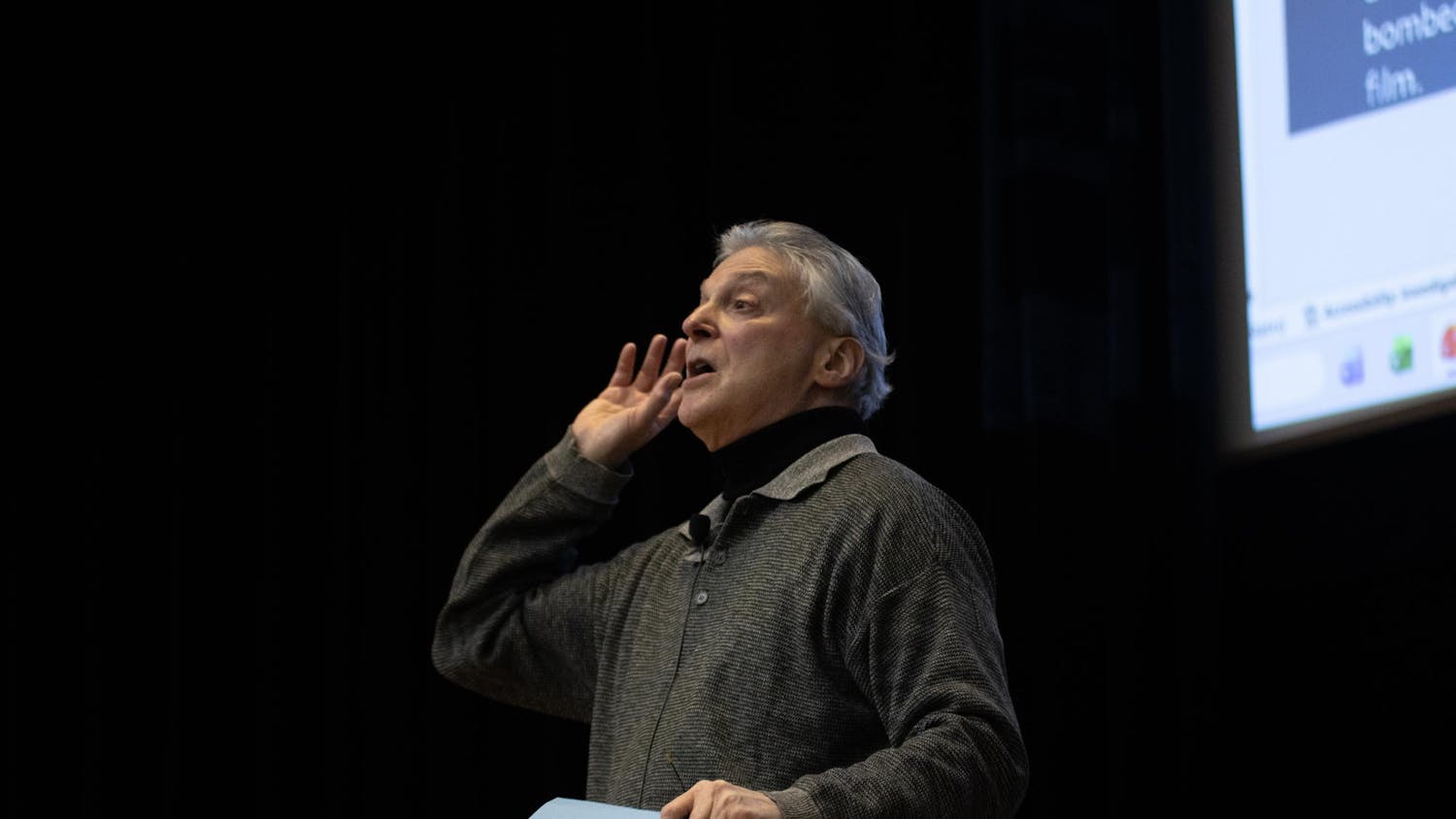
Emory University Professor of Digital Humanities Daniel Sinykin will tell you that ChatGPT can make a pretty convincing impression of Krusty the Clown, which is something he discovered in his open, proactive use of ChatGPT in the classroom setting.
ChatGPT is an artificial intelligence chatbot that was launched by artificial intelligence laboratory OpenAI on Nov. 30. The technology can generate nuanced text responses to short prompts from students, asking it to answer questions or even compose entire papers. This has created anxiety among some education leaders and professors because of the potential for the platform’s human-like writing capabilities to be used on academic assignments.
Sinkykin does not fall into this category. In his Intro to Digital Humanities course, he used ChatGPT to sum up the broad field of digital humanities to the class.
“ChatGPT is pretty good at summarizing broad topics in concise, cogent ways,” Sinykin said.
To demonstrate the capabilities of this overly-criticized technology, he prompted the chatbot to complete the same task, this time in the voice of Krusty the Clown.
“It did a really good imitation of the clown, actually,” Sinykin said.
Sinykin said that his expertise in the digital humanities has equipped him for the rise of new digital technologies like ChatGPT. The program doesn't fluster him; instead, he said he believes ChatGPT should prompt professors to rethink the way they teach, rather than blame the students for using technology.
“If we’re creating assignments that can be replicated by a computer program, is there something robotic about the assignment that we’ve asked students to produce in the first place?” Sinykin asked. “Are we thinking hard enough about what kind of learning is happening in the kind of assignments we're asking for?”
Sinykin said he believes that altering the teaching method could be enough to dissuade students from cheating.
“Maybe ChatGPT will make us think harder about how to give students something that they find valuable,” he said. “It's partially on us to design things that students find valuable for doing in and of itself, rather than outsourcing to computer.”
On the other hand, head of Emory College Honor Council, Jason Ceijka has focused on what ChatGPT means for a classroom setting in regards to plagiarism and violation of the honor code. Emory’shonor code states that, “Whenever any idea is taken from a specific work … the student should give credit where credit is due.”
Ceijka explained that based on this part of the honor code, the only way a student could ethically use ChatGPT would be if the program was required for a class project. Still, he said that the student would have to “acknowledge that source” and obtain permission from their professor to use the site.
“Students should not assume that they can use ChatGPT to write essays,” Ceijka said.”That is, by definition, plagiarism.”
Ceijka first heard about ChatGPT in Dec. 2022, as it had become very prevalent in the national media during this time. He observed a lot of press in the education industry, especially within his professional organization, The International Center for Academic Integrity.
He met with Emory colleagues interested in academic technologies and academic integrity on Jan. 17 over Zoom to discuss how academic staff and professors might navigate the challenges posed by this new technology. The meeting focused on locating “faculty experts” who could help facilitate a conversation with those less familiar with this technology about what is happening and how they can either use it or adapt their assignments to be less concerned about students using it as a form of plagiarism.
While Emory’s Honor Council has not yet had to deal with any instances of Emory students using ChatGPT as a tool for plagiarism, Ceijka has heard of instances of this occurring from colleagues at other universities.
To combat this, some public school systems have banned ChatGPT on their Wi-Fi networks to prevent plagiarism. Across the U.S., discussions revolving around planning responses to ChatGPT have risen to be a top priority in higher education. Universities are attempting to outsmart the chatbot by creating more intricate assignments, implementing stricter grading policies, and prioritizing in-class, and hand-written assignments. Universities like Washington University in St. Louis and University of Vermont have quickly revised their honor codes to flag the use of AI-generated text as a form of plagiarism.
Ceijka said that some of his colleagues at other universities have shared that their faculty may go back to assigning hand-written essays or giving more in-class assignments. He also mentioned that there are some AI-detection platforms that exist, such as GPT Zero and TurnItIn, but he has heard mixed reviews in regards to their reliability.
Ceijka predicts that since the technology is so new, there won’t be one standard approach that faculty across the University will take with it.
“Some will really embrace it and use it actively in their classes and others might be more cautious, but I expect we’ll see the whole spectrum,” Ceijka said.
Christopher Blake, a professor of economics at Oxford College, voiced unease about the vast capabilities of the technology.
“My concern lies in the fact that such a disruptive technology inherently causes some to become worse off and some to become better off, even if society is improved,” Blake said. “The only difference between the impacts of the internet and ChatGPT might be the magnitude of the effects, which certainly are unknown but are likely to be greater given the technology's potential.”
He also said that he fears the advent of ChatGPT will impair students’ critical thinking skills.
“The internet is too vast for one human to digest, interpret, critique, and analyze, but ChatGPT provides additional support that could be leveraged for good or bad,” he said.
Because of his belief in ChatGPT’s inevitable staying power, Sinykin said that our efforts are best spent learning how to proactively incorporate this technology into an academic setting, as opposed to negatively coding it as a cheating device.
“If students can perform at the same level using this technology, then we ought to get students thinking about how to work with this technology, rather than immediately thinking we need to go back into the past or try to halt progress as it's happening,” Sinykin said.
Jacqui Leigh Russell (25C) said she didn't know about ChatGPT until one of her professors explicitly stated not to use it in the directions of an assignment.
“I’m scared to use it now,” Russell said. “I’m not really aware of its capabilities and I don’t want to get in trouble for accidentally misusing it. So I’d rather stay away from it to be safe.”
On the other hand, Helen Khuri (25C) expressed optimism about the benefits of ChatGPT, stating it shouldn’t “be something that’s feared.”
“I feel like we should work with it,” Khuri said. “I don’t want to write it off as something ‘bad’ just because it has the capacity to be. Part of success is using resources in smart and responsible ways, and AI is the newest resource.”
Sinykin has already started proactively incorporating ChatGPT into work that he assigns to students. In a future assignment, he said he plans to have students attempt to create “the strongest essay they can” using the program. By “learning how to engage with ChatGPT,” he said that they will be able to “become aware of what the criteria of good writing are in this context,” and discover areas in which ChatGPT excels and those in which it fails in replicating human writing.
“Detection is only a small piece of a solution to this,” Ceijka says. “Really, it's about how we as faculty adjust our pedagogy. And, how do we use different forms of evaluation and assessment to make sure that students are learning?”
Ceijka said that he is optimistic that the academic industry will be able to take on this challenge.
“Most of us recognize this is a new technology and we have encountered other new technologies that have impacted how we teach,” he said. “So, whether that's the calculator, whether that's the advent of the internet, whether it's ChatGPT, faculties and universities have responded to these things in the past, and they’ll respond to new technologies as they come on the horizon in the future.”







